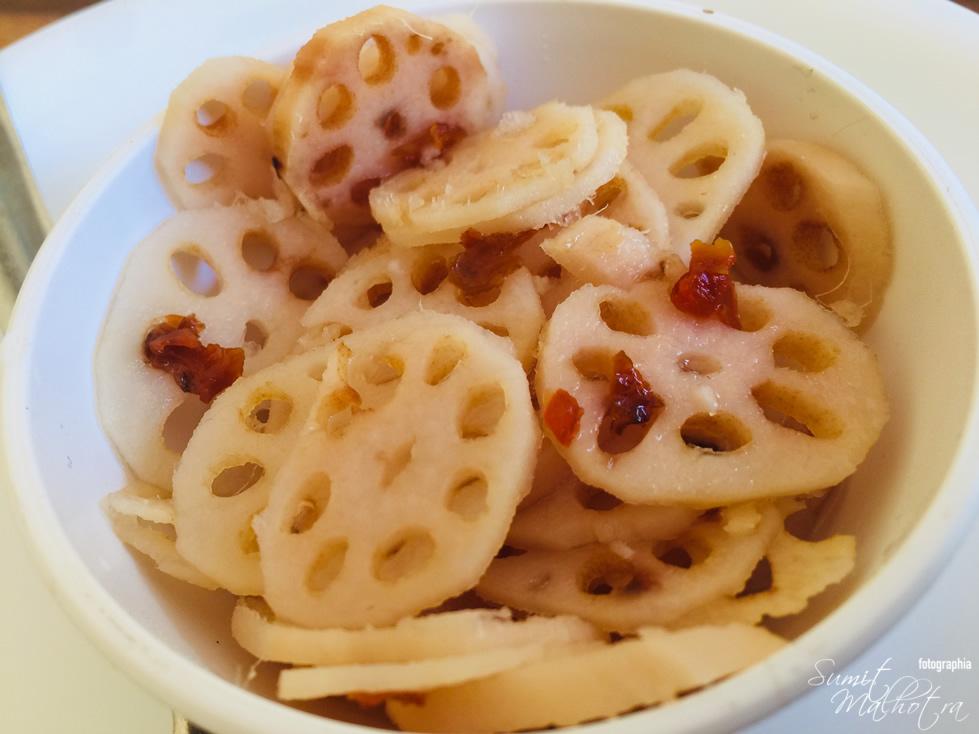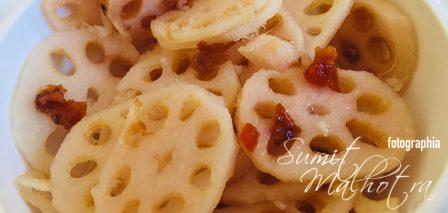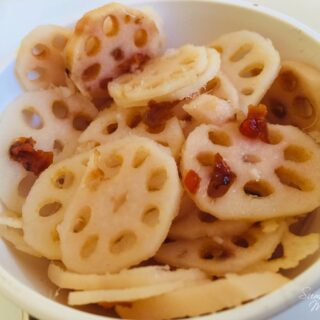Lotus Root Pickle Recipe | Lotus Stem Pickle Recipe
Lotus Root Pickle Recipe | Lotus Stem Pickle Recipe although known as a root, is made from the stem (or rhizome) of lotus plant. It is known as kamal kakdi or bhae in India.
With those iconic, beautiful flowers in bloom above the surface of the water, the lotus stem / root or kamal kakdi remains in the mud below.
The root or the stem can reach up to around four feet in length, and has a segmented appearance. This striking pattern resembles old rotary dial phones.
What is lotus root good for?
This crisp Asian root vegetable is very popular in Chinese and Japanese cuisines, although it is widely consumed throughout Asia. In India it is also used to make a splendid curry with potatoes.
This Pickled Lotus Root recipe or lotus stem pickle can be your next appetiser idea. The sweet and sour with a hint of spicy stimulate your appetite and make you extra hungry for your meal!
Lotus root or kamal kakdi has a wide range of health benefits. The Chinese believe that it is of high medicinal value.
Lotus Root Pickle Recipe | Lotus Stem Pickle Recipe – Inspired by Japanese & Chinese Cuisines but using Naga Mirch
Lotus root or kamal kakdi have always intrigued me. Having said this, I should also state that I have always relished them.
Kamal kakdi, also known as bhae in India, is a woody, edible root (or rhizome) that can grow as long as four feet. I am today inspired to make kamal kakdi or lotus root pickle so let us get to know it a little more.
Kamal kakdi is a versatile vegetable and food connoisseurs worldwide vouch for this vegetable that can be steamed, deep-fried, braised or stir-fried, making it a relishing ingredient.
The best part of kamal kakdi is its incredibly unique texture that retains its crunchiness while staying tender even after cooking.
Fresh lotus root is a popular ingredient in Indian, Chinese & Japanese cooking and gets ready in minutes without a long painstaking process.
What are the health benefits of Lotus Root?
In Chinese cuisine, the root is processed into lotus root starch or dried and ground into powder, and both of these are often used in Chinese medicine and added to food for extra health benefits.
Lotus root contains a moderate amount of calories, as far as root vegetables go. It’s high in dietary fibre and vitamins C and B and contains a good amount of important minerals.
It is high in fibre, vitamins and minerals. 100 grams of lotus stem contains 73% of your daily vitamin C requirement!
The lotus stem or root aids in stimulating blood circulation, promotes mental clarity and mood, regulates blood pressure, aids in digestion and promotes heart health.
In Japanese cuisine, marinated in a sweet vinegar-based sauce, Pickled Lotus Root called Su Renkon (酢れんこん) is one of the popular Osechi Ryori (Japanese New Year Food).
As per Nami from Just One Cook Book, Su Renkon is the Japanese New Year Food. It is considered an auspicious food for the Japanese New Year because its many holes signify it is a symbol of an unobstructed view of the future.
It also has many seeds, hence it’s been eaten to pray for the prosperity of descendants.
The lotus stems pickle recipe below is inspired by Chinese & Japanese cuisines and made with my twist as almost always. I am using Naga Mirch or Bhot Jolokia to spice it up. I use Naga Mirch to make my chilli oil recipe as well.
Lotus Root Pickle | Lotus Stem Pickle | Pickled Lotus Root | Pickled Lotus Stems
Ingredients
- 4 Lotus Roots
- 3 Tablespoons Vinegar
For Seasoning
- 2 Litres Water
- ½ Cup White vinegar Rice vinegar is best
- 10 Cloves Garlic
- 3 Tbsp Sugar (add more if the solution is too tangy)
- ¾ Tsp Salt
- 2 PIece Naga Mirch Dry
Instructions
- Get your ingredients for Lotus Root Pickle ready.
- Peel the lotus roots for lotus root pickle.
- Slice them into 2-3mm discs.
- Soak them in water mixed with 3 tablespoons of vinegar for 5 minutes.
- Finely chop garlic for the pickle.
- Add sugar.
- Add garlic & salt.
- Mix well and put on the flame.
- Add the lotus root slices and spread them out evenly in the liquid.
- Next add, naga chillies & vinegar.
- Boil it for 5-7 minutes.
- Store it in the refrigerator to soak for at least 6 hours so the flavours absorb completely.
- Your Lotus Root Pickle is ready
Notes
- Enjoy the Pickled Lotus Root either chilled or at room temperature. You can keep it in the refrigerator for up to 5–7 days and in the freezer for up to a month.
- Make sure the lotus root slices are covered in the sauce during storage.
Lotus Root Pickle Recipe Step by Step
To Sum It Up
This Pickled Lotus Root recipe or lotus stem pickle can be your next appetiser idea.

Your lotus root pickle is ready
Lotus Root Pickle Recipe | Lotus Stem Pickle Recipe, although known as a root, is made from the stem (or rhizome) of the lotus plant. It is known as kamal kakdi or bhae in India.
With those iconic, beautiful flowers in bloom above the surface of the water, the lotus stem/root or kamal kakdi remains in the mud below.
The root or the stem can reach up to around four feet in length, and has a segmented appearance. This striking pattern resembles old rotary dial phones.
If you are a traveller and or a driver, you may find below a list of items that will fortify your travel experience. I use many of these myself for all my trips. They are modestly priced and quite important to keep handy.
- Travel Adapter – https://amzn.to/3A04EJp
- Action Camera – https://amzn.to/4eCSMfF
- Camera Mounts & Accessories – https://amzn.to/4eG4je2
- Dashcam – https://amzn.to/3U2j4Qc
- Neck Rest – https://amzn.to/3Y6ZP98
- Tyre Inflator – https://amzn.to/3U8HpDP
- Storage – https://amzn.to/3XVQFMI
- Car Laptop Charger – https://amzn.to/3XXMVdA
- Vacuum Cleaner Cordless – https://amzn.to/3Yo1hWd
- Air Mattress – https://amzn.to/4015Bvu
- Jack Ratchet Wrench – https://amzn.to/3YkxddO
- Cleaning Cloth Microfibre – https://amzn.to/3NIOFmt
- Rechargeable Solar LED Torch – https://amzn.to/3Yj4h5Y
- Electronics Accessories Organiser – https://amzn.to/3A04XUz
- Pocket Travel Data Transfer Tool – https://amzn.to/3zMTxnc
- Smart Tracker for Keys – https://amzn.to/3BTuIq0
- Rechargeable Plasma Arc Lighter – https://amzn.to/3JA0VqE
- Camping Cookware Kit – https://amzn.to/3BIy0N3
- Sleeping Bag – https://amzn.to/3U7v2rP
GoSumItUp is a personal blog written and edited personally by me. All opinions expressed are my own which are honest and have not been influenced by any means.
My reviews are dependent on the visits at the time and revisits will be reviewed again as they may have a different experience or the same.
I am not a food critic nor do I consider myself as one, this platform allows me to write and review my own personal dining experiences, may they be good or bad, delicious or not, all are honest and truthful opinions.
Suppose you disagree or agree with me at any point or do not receive the same experiences as I have. In that case, I do not hold any responsibility as everyone will have their own experiences that they will encounter themselves.
I pay for all meals. However, if any meals or product has been sponsored or compensated or if I was an invited guest, it will be clearly disclosed at the end of each review.
All images on this blog are my own unless stated otherwise. If you wish to use any of my photography for any purposes, please do not use it without any written permission and give credit and/or link back to the website.
If you would like to send a product or any sponsors/endorsements, it may or may not be published and reviewed on the website.
If you wish to send any products or invitations for any media, press or collaborations etc., consider if it is something related to the content of the website and if you see fit, please visit the Contact page for contact details.
Thank You.
Thank you for visiting GoSumItUp! I hope you enjoy the reviews & recipes found at www.gosumitup.com.
This page consists of disclaimers regarding the recipe, its outcome, nutrition, and food handling safety decisions.
The recipes have been cooked and compiled by me for general information only and should not be used to diagnose or treat any medical condition/s.
This information is not intended to diagnose, treat, cure, or prevent any disease as well.
GoSumItUp.com has used all reasonable care in compiling the information but offers no warranty as to its accuracy or its use in any possible form.
Consult a doctor or other health care professional for diagnosis and treatment of any medical condition/s. For more details please refer to our disclosure policy.
If you like this article, you can let us know in the comments below or on social media using #gosumitup and tag @gosumitup on Facebook.
I am always happy to read your feedback and if you liked the dish or if you made the dish. :)
Better still, take a picture and post it on Instagram and tag it as #gosumitup
Connect direct – You can also connect with me directly on my Instagram and Facebook or on Pinterest.
And, keep visiting us for more of such awesomeness. Do bookmark gosumitup.com into your web browser now or simply subscribe to our browser notifications.
[/vc_section]


